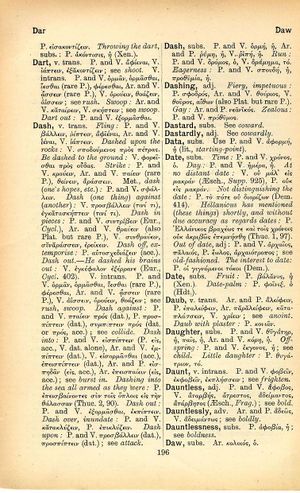dash: Difference between revisions
Τὸ γὰρ θανεῖν οὐκ αἰσχρόν, ἀλλ' αἰσχρῶς θανεῖν → Mors ipsa non est foeda, sed foede mori → Das Sterben bringt nicht Schmach, doch sterben in der Schmach
(Woodhouse 2) |
(CSV3) |
||
| Line 1: | Line 1: | ||
{{ | {{Woodhouse1 | ||
| | |Text=[[File:woodhouse_196.jpg|thumb|link={{filepath:woodhouse_196.jpg}}]]'''v. trans.''' | ||
<b class="b2">Fling</b>: P. and V. βάλλειν, ῥίπτειν, ἀφιέναι, Ar. and V. ἱέναι, V. ἰάπτειν. | |||
<b class="b2">Dashed upon the rocks</b>: V. σποδούμενος πρὸς πέτρας. | |||
<b class="b2">Be dashed to the ground</b>: V. φορεῖσθαι πρὸς [[οὖδας]]. | |||
<b class="b2">Strike</b>: P. and V. κρούειν, Ar. and V. παίειν (rare P.), θείνειν, ἀράσσειν. | |||
Met., <b class="b2">dash</b> (<b class="b2">one's hopes, etc.</b>): P. and V. [[σφάλλω|σφάλλειν]]. | |||
<b class="b2">Dash</b> (<b class="b2">one thing</b>) <b class="b2">against</b> (<b class="b2">another</b>): V. προσβάλλειν (τινί τι). ἐγκατασκήπτειν (τινί τι). | |||
<b class="b2">Dash in pieces</b>: P. and V. συντρίβειν (Eur., ''Cycl.''), Ar. and V. θραύειν (also Plat. but rare P.), V. συνθραύειν, συναράσσειν, ἐρείκειν. | |||
<b class="b2">Dash off, extemporise</b>: P. αὐτοσχεδιάζειν (acc.). | |||
<b class="b2">Dash out.</b> <b class="b2">— He dashed his brains out</b>: V. ἐγκέφαλον ἐξέρρανε (Eur., ''Cycl.'' 402). | |||
V. intrans. P. and V. ὁρμᾶν, ὁρμᾶσθαι, ἵεσθαι (rare P.), φέρεσθαι, Ar. and V. ᾄσσειν (rare P.), V. ἀΐσσειν, ὀρούειν, θοάζειν; see [[rush]], [[swoop]]. | |||
<b class="b2">Dash against</b>: P. and V. πταίειν [[πρός]] (dat.), P. προσπίπτειν (dat.), συμπίπτειν [[πρός]] (dat. or [[πρός]], acc.) <b class="b2"></b>, see [[collide]]. | |||
<b class="b2">Dash into</b>: P. and V. εἰσπίπτειν (P. εἰς, acc., V. dat. <b class="b2">alone</b>), Ar. and V. ἐμπίπτειν (dat.), V. εἰσορμᾶαθαι (acc.), ἐπεισπίπτειν (dat.), Ar. and P. εἰσπηδᾶν (εἰς, acc.), Ar. ἐπεισπαίειν (εἰς, acc.); see [[burst in]]. | |||
<b class="b2">Dashing into the sea all armed as they were</b>: P. ἐπεισβαίνοντες σὺν τοῖς ὅπλοις εἰς τὴν θάλασσαν (Thuc. 2, 90). | |||
<b class="b2">Dash out</b>: P. and V. ἐξορμᾶσθαι, ἐκπίπτειν. | |||
<b class="b2">Dash over, inundate</b>: P. and V. [[κατακλύζω|κατακλύζειν]], P. ἐπικλύζειν. | |||
<b class="b2">Dash upon</b>: P. and V. προσβάλλειν (dat.), προσπίπτειν (dat.); see [[attack]]. | |||
'''subs.''' | |||
P. and V. [[ὁρμή]], ἡ, Ar. and P. [[ῥύμη]], ἡ, [[ῥιπή]], ἡ. | |||
<b class="b2">Run</b>: P. and V. [[δρόμος]], ὁ, V. [[δράμημα]], τό. | |||
<b class="b2">Eagerness</b>: P. and V. [[σπουδή]], ἡ, [[προθυμία]], ἡ. | |||
}} | }} | ||
Revision as of 09:26, 21 July 2017
English > Greek (Woodhouse)
v. trans.
Fling: P. and V. βάλλειν, ῥίπτειν, ἀφιέναι, Ar. and V. ἱέναι, V. ἰάπτειν.
Dashed upon the rocks: V. σποδούμενος πρὸς πέτρας.
Be dashed to the ground: V. φορεῖσθαι πρὸς οὖδας.
Strike: P. and V. κρούειν, Ar. and V. παίειν (rare P.), θείνειν, ἀράσσειν.
Met., dash (one's hopes, etc.): P. and V. σφάλλειν.
Dash (one thing) against (another): V. προσβάλλειν (τινί τι). ἐγκατασκήπτειν (τινί τι).
Dash in pieces: P. and V. συντρίβειν (Eur., Cycl.), Ar. and V. θραύειν (also Plat. but rare P.), V. συνθραύειν, συναράσσειν, ἐρείκειν.
Dash off, extemporise: P. αὐτοσχεδιάζειν (acc.).
Dash out. — He dashed his brains out: V. ἐγκέφαλον ἐξέρρανε (Eur., Cycl. 402).
V. intrans. P. and V. ὁρμᾶν, ὁρμᾶσθαι, ἵεσθαι (rare P.), φέρεσθαι, Ar. and V. ᾄσσειν (rare P.), V. ἀΐσσειν, ὀρούειν, θοάζειν; see rush, swoop.
Dash against: P. and V. πταίειν πρός (dat.), P. προσπίπτειν (dat.), συμπίπτειν πρός (dat. or πρός, acc.) , see collide.
Dash into: P. and V. εἰσπίπτειν (P. εἰς, acc., V. dat. alone), Ar. and V. ἐμπίπτειν (dat.), V. εἰσορμᾶαθαι (acc.), ἐπεισπίπτειν (dat.), Ar. and P. εἰσπηδᾶν (εἰς, acc.), Ar. ἐπεισπαίειν (εἰς, acc.); see burst in.
Dashing into the sea all armed as they were: P. ἐπεισβαίνοντες σὺν τοῖς ὅπλοις εἰς τὴν θάλασσαν (Thuc. 2, 90).
Dash out: P. and V. ἐξορμᾶσθαι, ἐκπίπτειν.
Dash over, inundate: P. and V. κατακλύζειν, P. ἐπικλύζειν.
Dash upon: P. and V. προσβάλλειν (dat.), προσπίπτειν (dat.); see attack.
subs.
P. and V. ὁρμή, ἡ, Ar. and P. ῥύμη, ἡ, ῥιπή, ἡ.

